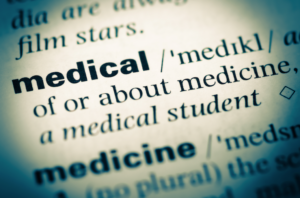 Doctors must complete a four-year undergraduate degree program, spend another four years in medical school and then complete residency training which, depending on specialty, can extend from three to seven years. That is a total of up to fifteen total years of study. Is it any wonder they speak in a relatively foreign tongue to the rest of us?
Doctors must complete a four-year undergraduate degree program, spend another four years in medical school and then complete residency training which, depending on specialty, can extend from three to seven years. That is a total of up to fifteen total years of study. Is it any wonder they speak in a relatively foreign tongue to the rest of us?
Many professions have their own lingo that most others who are not in that field don’t generally understand, but in the medical profession this disconnect with the layperson tends to feel exaggerated as they are not communicating just amongst themselves and their peers who have also had training, they need to be able to convey to their diagnoses, thoughts, and possible strategies aimed at wellness in a way that can be easily understood.
The fact is that not all doctors have the best bedside manner or the ability to simplify and communicate effectively on a level a layperson can grasp. This can leave patients nodding their heads, but not fully understanding and if there was ever a topic that really needs to be fully related and heard it is your own medical advice.
One of the best ways that you can take matters into your own hands is to brush up on your basic medical lingo and even more importantly, if you don’t understand something you are being told, do not be afraid to ask questions.
Here are some of the most used medical terms you may hear from your physicians and a good jumping off point for better understanding your own health.
ABATEMENT – A decrease in the acuity of a symptom.
ABSCESS – A collection of fluid located on or in the body. This is an immune system response to an infection. It is accompanied by redness and swelling.
ACUTE – Condition that comes on suddenly, with severity and ends after a short course.
AMBULATORY – Ability to walk.
ASYMPTOMATIC – Shows no symptoms.
BENIGN – A condition or abnormal growth that is treatable and not life-threatening.
BIOPSY – Removal of tissue for diagnostic purposes.
CYANOTIC – Bluish color of the skin due to poor circulation and lack of oxygen in the blood.
EDEMA – Abnormal accumulation of fluid in the body causing swelling of the affected area.
EMBOLISM – The halting of blood flow by a blood clot, which can result in a stroke or heart attack.
FIBRILLATION – Uncontrollable twitching of muscle fibers of the heart.
IDIOPATHIC – Of unknown cause.
PALLIATIVE – Treatment is given to alleviate symptoms of a disease but not cure it. This mainly refers to pain management of a chronic disease state.
RADICULAR – Referring to the nerve roots which originate in the spine.
SUBLUXATION – A slight dislocation or misalignment of a bone in a joint.
The more well-versed you are in medical terms, the better you will feel when engaged with doctors, nurses and other medical personnel, whether it’s regarding your own health or that of a friend or loved one.
To find a doctor in Lee County, Florida please visit our free resource www.ipalc.org/find sponsored by the Independent Physicians Association of Lee County.
Share on Facebook



 Southwest Florida Medicine.com is dedicated to bringing you the very best health information available today!
Subscribe or check back regularly!
Southwest Florida Medicine.com is dedicated to bringing you the very best health information available today!
Subscribe or check back regularly!